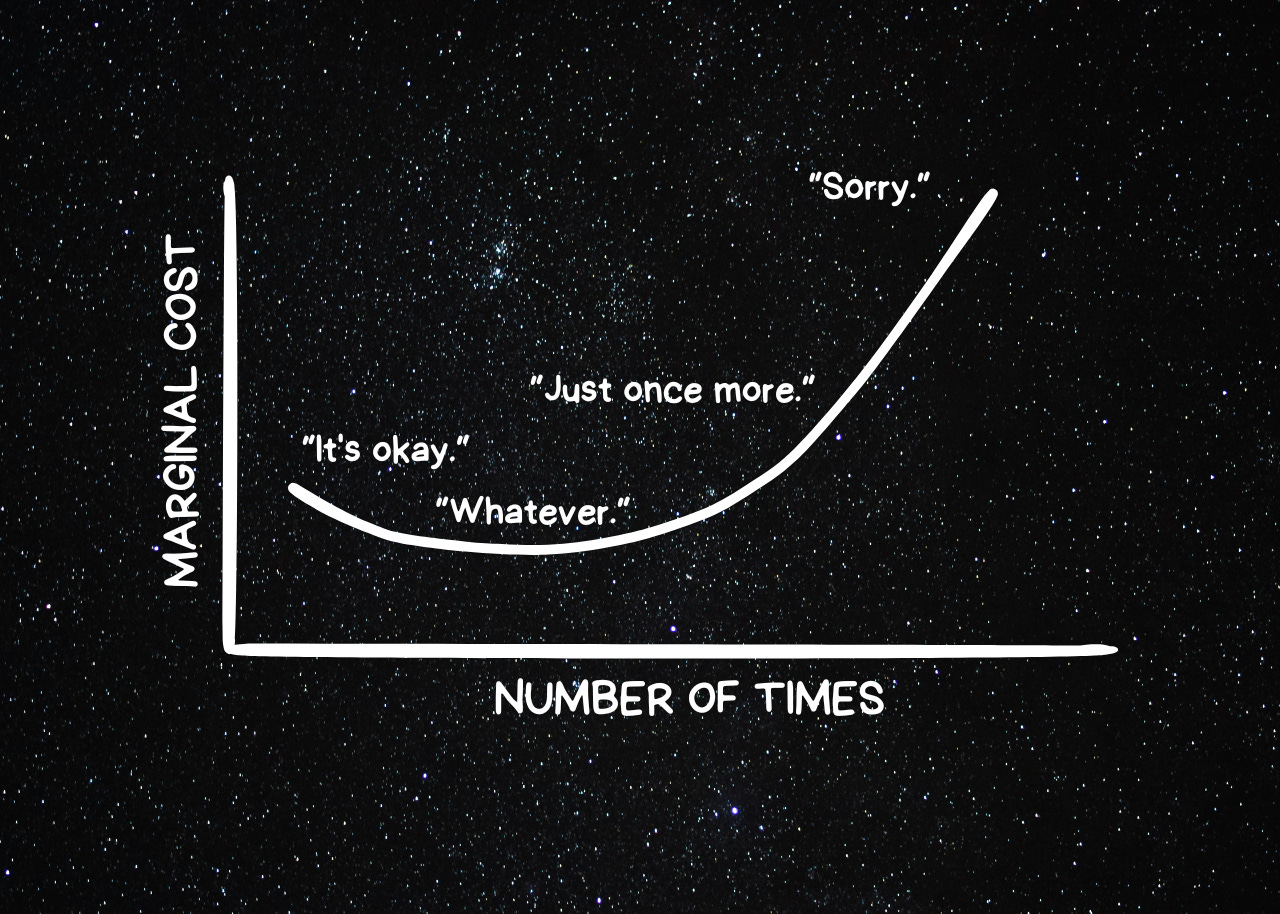🏷️ Categories: Life lessons, Behavior, Decision making and biases.
Sometimes it is so easy to justify what we would have previously considered unthinkable....
It is curious to see that even people with solid principles fall into the temptation to do what they never wanted to do, to say what they would never have said. One sentence changes everything: “just this once” or “it's okay”. And that's it, you find yourself doing what you would never do. As if by saying those magic words, the rules of the universe are altered, as if morality is something flexible that can be stretched just a little bit when it's in our interest....
You start sliding down a long slope of justifications.
That is cognitive dissonance, the psychological mechanism we use to justify the inconsistency between what we do and what we say we are (Festinger, 1962). Simply so that our whole identity does not break into pieces. You always find the perfect reason why this time you can do what you would never do.
“It is okay” are the 3 words that justify everything.
Each time we give in to temptation, the fall is quicker and less painful. What started out as something minimal, a single exception, eventually becomes a mountain of exceptions that become the new norm.
By the time you realize it, you don't even know how to go back....
The marginal cost trap
In economics there is the concept of marginal cost, the additional cost of making one more unit of the same thing. That is, looking only at what it costs to repeat the process one more time, without taking into account all the previous investment (O'Sullivan & Sheffrin, 2003). It is useful for economic decisions, but it is often applied in personal life without people even realizing it.
It is often seen like this in economics: “If producing 10 units of a product costs £100 and producing 11 units costs £110, the marginal cost of the eleventh unit would be £10.”
This is how it is seen in life: “If telling 1, 2 and 3 lies has had 0 consequences for me, the cost of telling one more lie will surely have 0 consequences as well.”
This idea that doing something a little bit more, just one more time, has no consequences....
As if the price were small and we had nothing to lose.
But yes, of course there is something to lose, everything you invested in your life.
Marginal cost does not see beyond the now, the short term, it does not look at the future, it does not look at everything you have already invested. At the beginning it seems cheap, but in the long term it is an irrecoverable ruin. And every time you take that shortcut, you pay the price. But it's not an obvious price. It's not something you feel right away. It's a small crack. And, like everything that rests on cracks, sooner or later, it collapses.
It's easier to stand by your principles 100% of the time than it is to stand by them 98% of the time, because once you give in, giving in again is easier.
It's a dangerous game because it defines what kind of life you are building. Aristotle, in his theory of virtue, argued that our habitual actions shape our character. You become what you devote your time and attention to. Small actions, the ones that seemed unimportant, can take you to a place far removed from what you once said you would be.
Those who lie betray the people around them.
Those who are unfaithful betray their own sentimental relationship.
Those who abuse their power betray justice.
What seems “cheap” and tempting in the short term always ends up paying dearly.
Think about the long-term impact of your actions and not just the easiest decision in the present. Think about what you would look like if you kept repeating that action often for 5 days, 5 months and for 5 years. How will you look in the mirror after giving in so much? Can you live with that? Is it in line with who you want to be? What you want other people to see in you?
Luckily, there is guilt and shame, basic feelings for living in society.
Unfortunately, out there you will find people who have neither.
✍️ Your turn: What change have you made in your life for the better?
💭 Quote of the day x2: “Our character is the result of our conduct.” “I consider him braver who conquers his desires than he who conquers his enemies, for the hardest victory is victory over oneself.” Aristotle.
See you, take care of yourself! 👋
References 📚
Aristotle. Nicomachean Ethics.
Festinger, L. (1962). A Theory of Cognitive Dissonance. Stanford University Press.
O’Sullivan, A., & Sheffrin, S. M. (2003). Economics: Principles in Action.








I also suppose there is a change in what one perceives as normal. If we imagine a spectrum between 0 and and you find yourself at 0.7 and think conducts between 0.6 and 0.8 are ok. If. You start behaving at 0.62, then the normal boundary will shift to 0.52 to 0.72, and so forth... until you are at a place you never expected to be. Soon, you could be at a 0.3, far from what you ever found acceptable.
Comedian-singer Tim Minchin wrote a song about this shift in his romantic life and what would happen if he had to find a new partner. Funny, weird, and insightful.
“It's easier to stand by your principles 100% of the time than it is to stand by them 98% of the time, because once you give in, giving in again is easier.”
We talk about this a lot in the diabetic support groups. It’s easier to stick on “the plan” than to come off and on with “cheat days” etc. If you know why you’re doing the thing you’re doing , and what the consequences of not doing it are, it should be easier to make your decision. Of course it isn’t…. But the concept is true.
For example, 10 months ago I decided to only eat meat, to manage my diabetes better. I was doing great until Thanksgiving, when I had “just a piece of gluten free pie” at my friend’s house. Sugar cravings returned. After all that time. One piece of pie after 10 months. Then I went to a party and had “one sliver of a piece of pizza”. The slippery slope begins. I was in bed for a whole day after.
For me, as in this example, when the outcome seems so clear, it’s easier for me to understand why 100% is better than 99%. (I decided I’m returning to my diet despite it being the holidays. I’m not turning one day in bed to more of that.)
But for actions, like you said, that do not have obvious immediate negative results, that can be the challenge. It’s worth considering the long term outcome before you “make the harmless move”. But it might be easiest if all to just stick with your 100% and not have to worry about the consequences later.